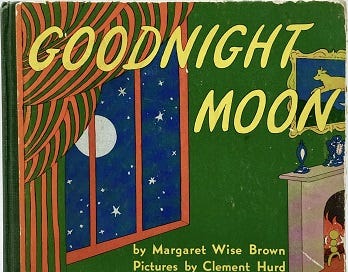1 | Jon Klassen and Mac Barnett, creators of popular modern picture books (my favorites are Triangle and Square), have a new-ish Substack where they write about classics of their genre. Naturally they covered Goodnight Moon, highlighting how strange the book is—there are disappearing socks, pictures that blend what’s real with what’s imagined, and a cover that breaks the normal rules of art.
They claim that the book is a classic because going to sleep is itself strange, especially for children. Goodnight Moon validates that feeling.
2 | Restoration Hardware, a home goods company that imports a lot of stuff from Asia, happened to hold its earnings call at the same time as the tariff announcement. Its CEO’s live reaction might be the best five-word poem ever: "oh really, oh shit, okay."
3 | The “hot hand” is an eternal question in basketball, but this fun paper looks at it in Jeopardy: are contestants more likely to get the next question right if they’re on a streak of correct answers? It finds that they are, but contestants overestimate the effect (betting too much on Double Jeopardy when they’re hot), which is also where the original basketball debate landed. Just as in hoops, it’s hard to control for all factors, but I love the idea.1
4 | Most of this history of pizza in the US is great, because pizza is great. Especially interesting: Chicago pizza had been around for decades before it became known as “deep dish,” at which point it wasn’t that much different than what you’d find everywhere else. But once it had the name, Chicago pizzerias leaned into it, making it “deeper and dishier” over time.
5 | I think I’m fairly tech-aware, but I had no idea that a drone delivery company, Manna, is already sending hundreds of items per day to houses in one Irish neighborhood. (I heard about it from a subscription-only podcast, but this article covers the highlights.) Surprisingly, they focus on not packages, but small orders of prepared food (cups of coffee, burgers, ice cream) where speed is important and human delivery is cost-prohibitive in the suburbs. I'm a bit of a Luddite when it comes to food delivery—I winced a little when he said "Suburban living will have all the advantages of urban living: get delivery in 10 minutes to your house from anywhere in the whole city"—but I’m curious to see how it goes.
6 | Here’s a funny story of a guy whose car wouldn’t start when he got vanilla ice cream, but worked fine when he got other flavors.
7 | When I interned at Sports Illustrated in college, a veteran photography editor held a lunch-and-learn session where he told us, “winners are boring; the best photos are of the losers.” That’s stuck with me forever, but I never really thought about why it’s true. It clicked when I read Sam Miller on celebrations: players or fans of the winning team all just put their hands in the air, while losers do all sorts of different things.
8 | Matt Clancy shares a paper showing that 10% more startups are formed in a town when the first Starbucks arrives, because it’s a new place for people to collaborate. That effect size seems crazy to me, and all social science findings have to be taken with a grain of salt, but the study’s controls seem reasonable: it only holds when Starbucks is the first coffee shop in the area; there’s a similar effect for other sit-down chains but not for primarily to-go chains like Dunkin; and Starbucks openings cause the arrival of other coffee shops, creating more areas for collaboration.
9 | My mind is always blown by these behind-the-scenes with directors of live sports broadcast dictating which of dozens of cameras is going live every second.
10 | Every NYC restaurant (or SF/LA) rated by the attractiveness of people who leave Google Reviews.
11 | “Why did our six-year-old tell our four-year-old that mom was foaming at the mouth when giving birth?”
For example, contestants often go through a category in order, so when someone is an expert Biblical Names or whatever, they’ll seem “hot” when it’s just because they’re on a good topic. The paper claims to control for category but finds it has a small effect, which is hard to believe.




